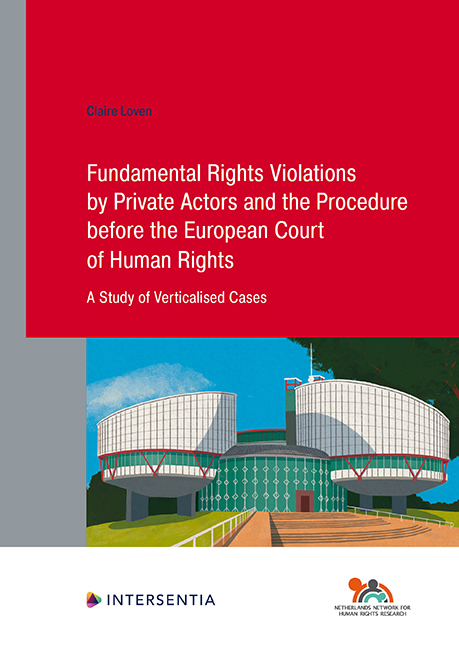 Fundamental Rights Violations by Private Actors and the Procedure before the European Court of Human Rights
Fundamental Rights Violations by Private Actors and the Procedure before the European Court of Human Rights The implications of verticalisation have been examined here in detail so as to establish the extent to which verticalised cases pose challenges to the Convention system. The previous two chapters focused on possible problems that may arise during the Court's proceedings with respect to verticalised cases, and possible problems that may arise after these proceedings, with attention being paid to implications of the Court's current approach to verticalised cases for private actors, for Convention States and for the Court itself. This conclusion summarises these findings, showing that verticalised cases do indeed have implications for all actors involved and therefore pose challenges to the Convention system.
Starting with possible problems manifesting themselves during the Court's proceedings, it is important, first, to point out that the implications for private actors, Convention States and the Court itself, all relate to the fact that, in verticalised cases, one of the original parties in the conflict at the domestic level is not involved in the Court's proceedings and thus disappears from the conflict. For private actors, this results in a situation in which the disappeared party is not able to defend or explain his acts, interests or rights unless he intervenes as a third party in the Court proceedings. This poses challenges to the Convention system because, with the exception of cases related to one's surroundings, these acts, interests or rights may be part of the Court's examination in a verticalised case. For example, the Court may scrutinise the acts of the disappeared party or explicitly consider that party's interests, without having any information provided by the disappeared party. This also implies that the Court may be confronted with a situation in which it has to examine a verticalised case without having a full and balanced account of the facts of the case and all the rights and interests at stake. This is not only problematic for private actors, but also for the Court itself. Furthermore, it may result in a situation in which Convention States are asked to defend the rights and interests of the disappeared party, while they may be unwilling to do so or incapable of such.
Second, it was shown that the fact that the disappeared party is not involved in the Court's proceedings not only gives rise to problems during the proceedings, but also to problems afterwards. This is because a Court judgment in a verticalised case may strongly impact on the legal situation at the domestic level.
To save this book to your Kindle, first ensure [email protected] is added to your Approved Personal Document E-mail List under your Personal Document Settings on the Manage Your Content and Devices page of your Amazon account. Then enter the ‘name’ part of your Kindle email address below. Find out more about saving to your Kindle.
Note you can select to save to either the @free.kindle.com or @kindle.com variations. ‘@free.kindle.com’ emails are free but can only be saved to your device when it is connected to wi-fi. ‘@kindle.com’ emails can be delivered even when you are not connected to wi-fi, but note that service fees apply.
Find out more about the Kindle Personal Document Service.
To save content items to your account, please confirm that you agree to abide by our usage policies. If this is the first time you use this feature, you will be asked to authorise Cambridge Core to connect with your account. Find out more about saving content to Dropbox.
To save content items to your account, please confirm that you agree to abide by our usage policies. If this is the first time you use this feature, you will be asked to authorise Cambridge Core to connect with your account. Find out more about saving content to Google Drive.